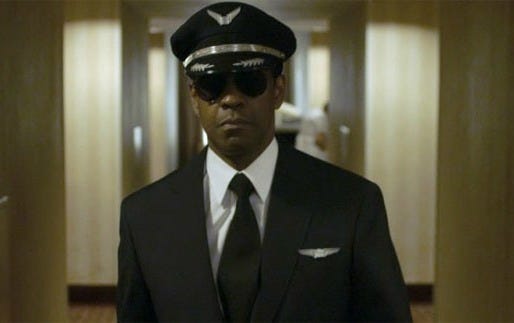Flight

In his long career, Denzel Washington has played a lot of good guys and a few notable bad ones, but I'm not sure if he's ever played a guy like the one in "Flight."
The story is about a pilot who saves a jet full of passengers when his plane suffers a major malfunction. But in the days that come after the crash, questions arise that throw his heroism, and even his entire self-conception, into chaos.
William "Whip" Whitaker is a puzzle, a mystery wrapped in a cocoon of bravado and patter. He's been fooling everyone else for so long that he's even convinced himself that he fits his role to a T: that of the savvy, calm, cool and collected airline pilot. The image he projects is of a former Navy fighter pilot hot dog turned safe and seasoned commercial captain of the airwaves.
But Whip's got a secret. He drinks. A lot. Does a little coke, too, to bring himself up after the buckets of booze have worn him down. But once he's in the pilot's seat, he reasons, he's all business.
Except that one fateful day something on the plane breaks, and Whip and his green co-pilot (Brian Geraghty) are forced to undertake a risky crash-landing maneuver. The upshot: A lot of people are hurt, but only six out of 102 are killed. People are calling it a miracle. The media is buzzing. In simulated recreations, no other pilot is able to replicate Whip's daring deed.
And yet, the blood tests say he was legally drunk when he did this.
From there, the story takes on an unsteady rhythm, as the narrative meanders here and pools there. The original script by John Gatins goes in directions we don't expect; some of them pay off and others don't.
Whip is confronted by federal investigators, as well as the friendly head of the pilot's union (Bruce Greenwood) and the slick lawyer they've retained (Don Cheadle). Their job, they say, is to protect Whip. But the odds are dire: He could end up lauded as a hero, another Sully Sullenberger, or put in jail forever.
His first reaction is like the rest of his life up to now: bluster. "No one else could have landed that plane and saved those lives like I did," he proclaims. To him, it makes no difference whether he was legally impaired at the time because obviously the booze and drugs didn't affect him enough to prevent him from amazing actions.
But slowly Whip descends into a torpor, hiding out at his grandfather's abandoned farm, swilling astonishing amounts of liquor. We get the sense we're seeing the real man Whip hides from the world, one who's self-pitying, arrogant and not a little pathetic.
In the hospital, he meets Nicole (Kelly Reilly), a woman who overdosed on heroin. Her life is falling apart in much the same way as Whip's. Seeing a kindred soul in need, he gives her a place to stay when her money runs out. It's an unspoken but mutually understood arrangement that she will give herself physically to him as a reward.
Things build, slowly, to the big hearing before the National Transportation Safety Board. Will Whip straighten himself up in time to put on a convincing show? Can his lawyer get the toxicology report thrown out? As it turns out, the movie is not really about these things. Rather, it's an exploration of a man's fragile psyche and if he can recognize the failings underneath his brave veneer of competence.
This is the first live-action movie Robert Zemeckis has directed since 2000's "Cast Away," after an often regrettable decade exploring motion-capture animation. In many ways "Flight" is a return to familiar ground. Instead of being physically isolated, Whip is emotionally marooned. The trick to getting out of his trap is peering deep into his own self-reflection.
It's an engaging picture, and not for a moment was I ever bored. But I never quite got viscerally hooked into Whip's dilemma or felt like we ever get to really know him. As hard as it is for him to reach out for help, we never quite get a grip on him.
4 Yaps

